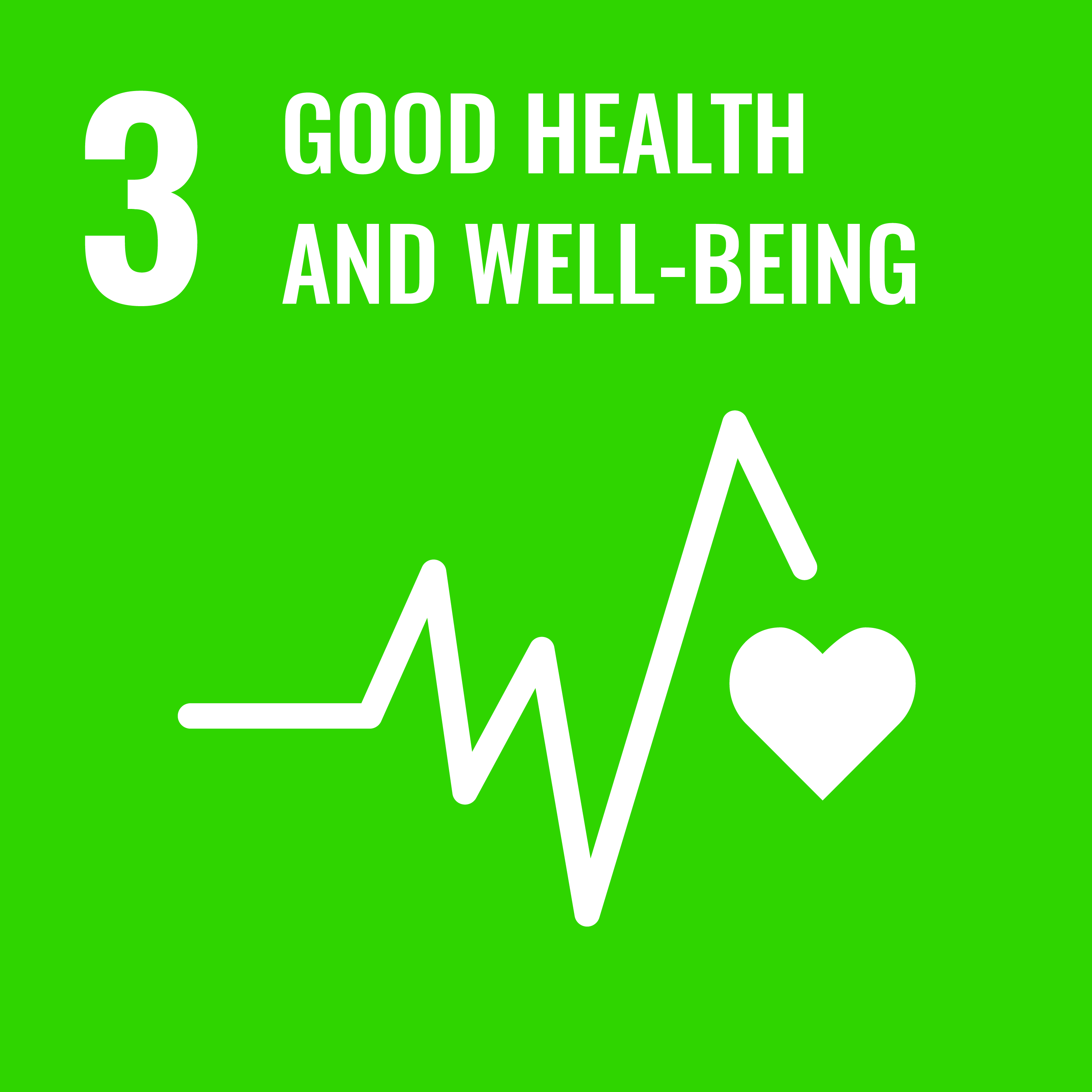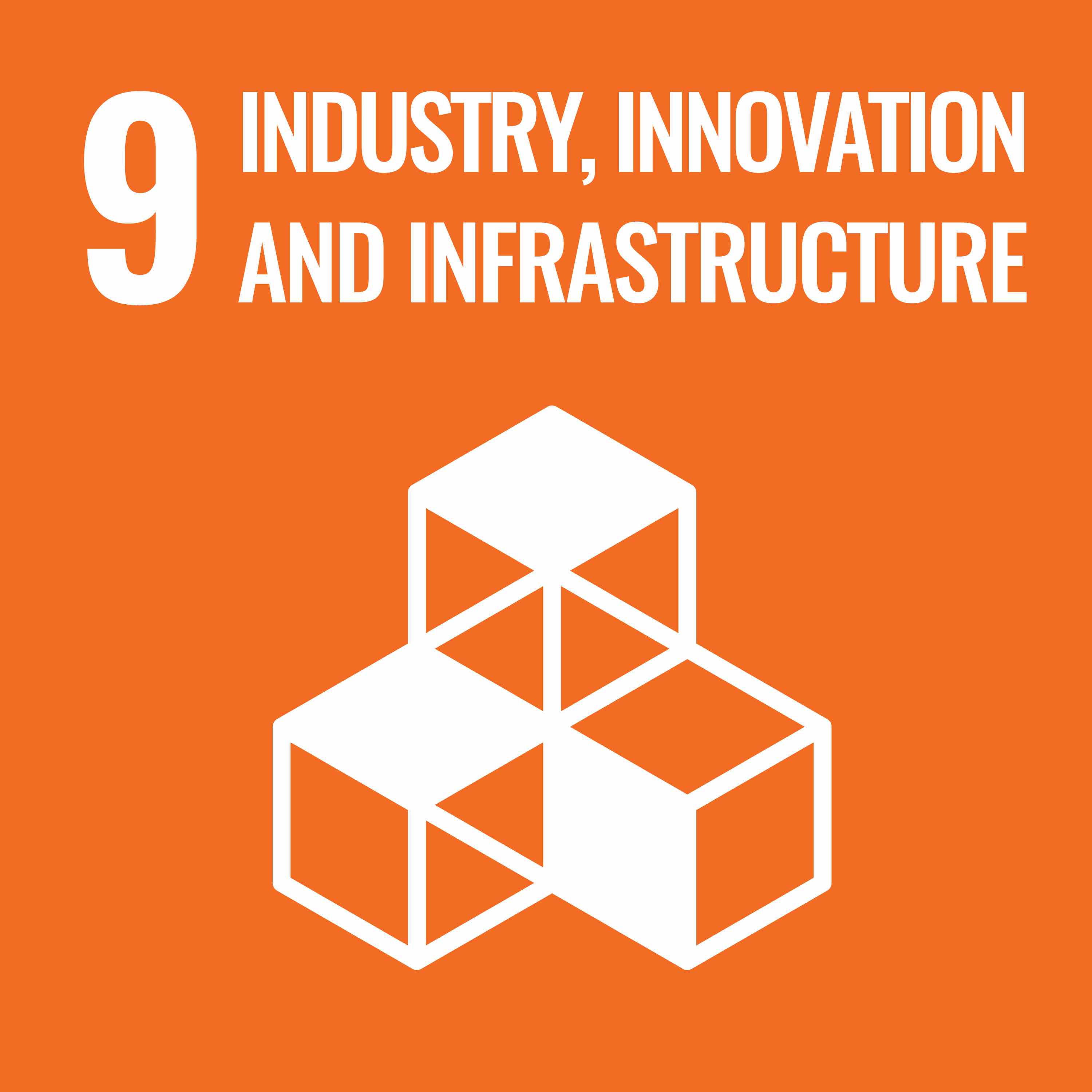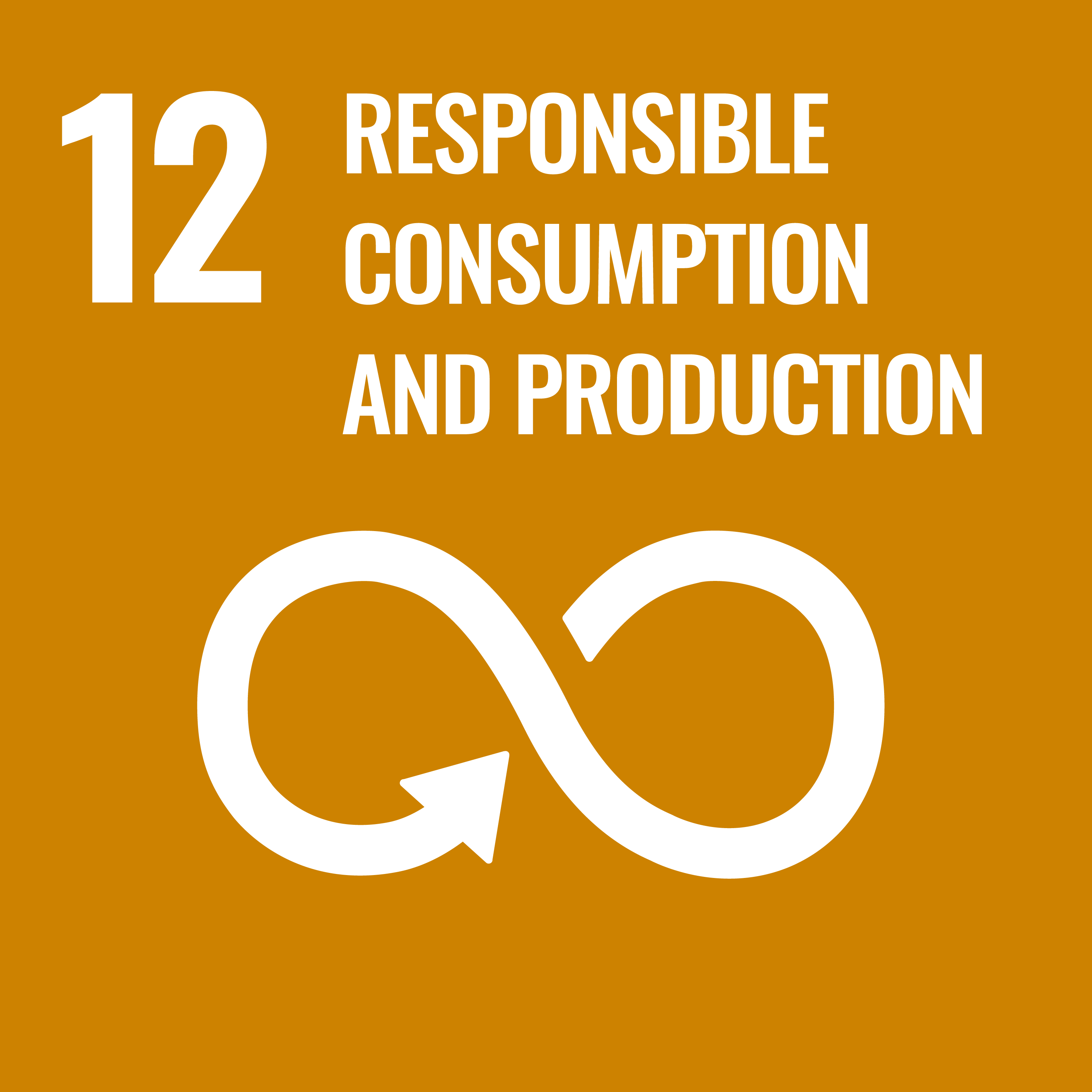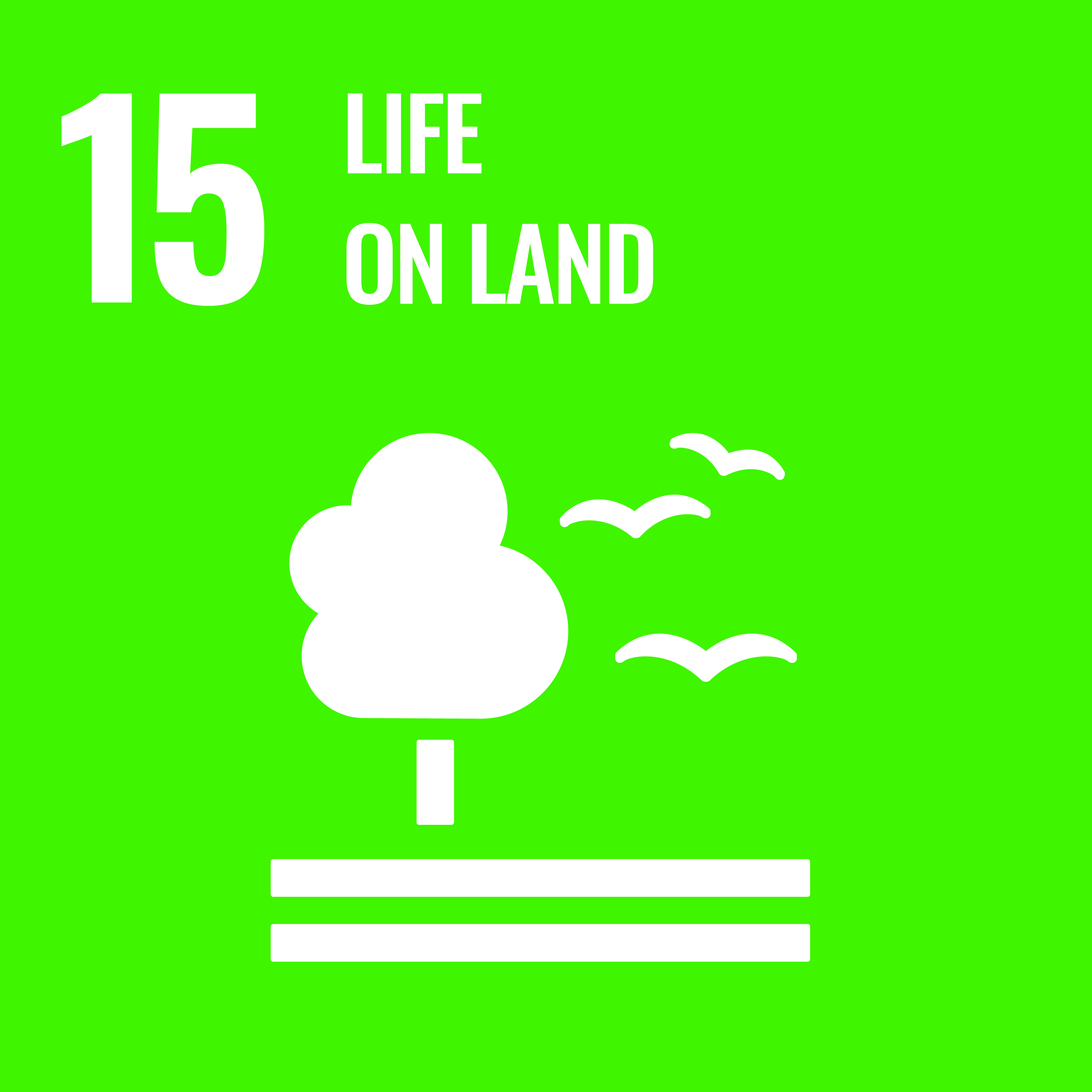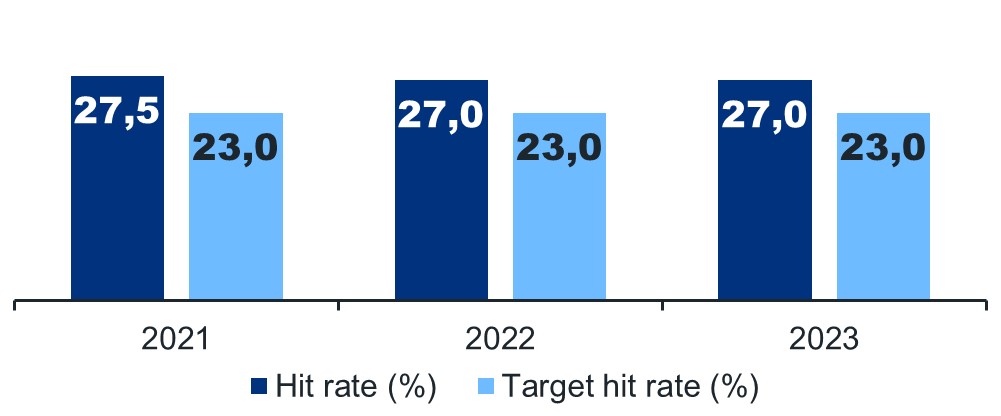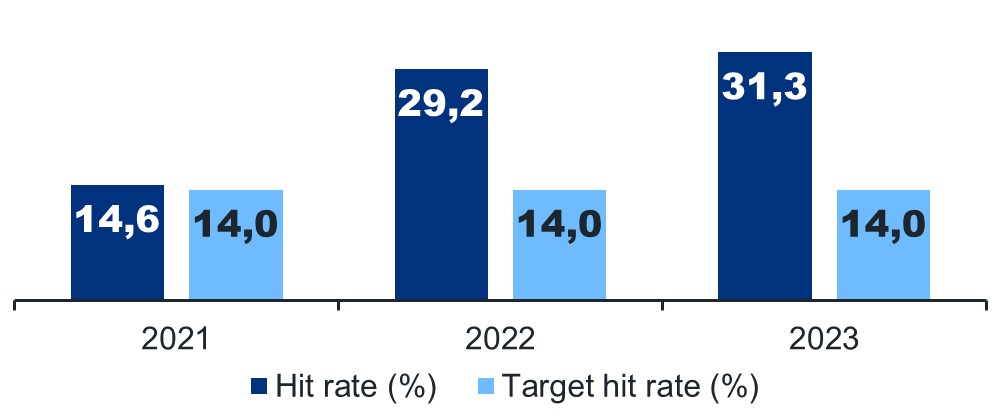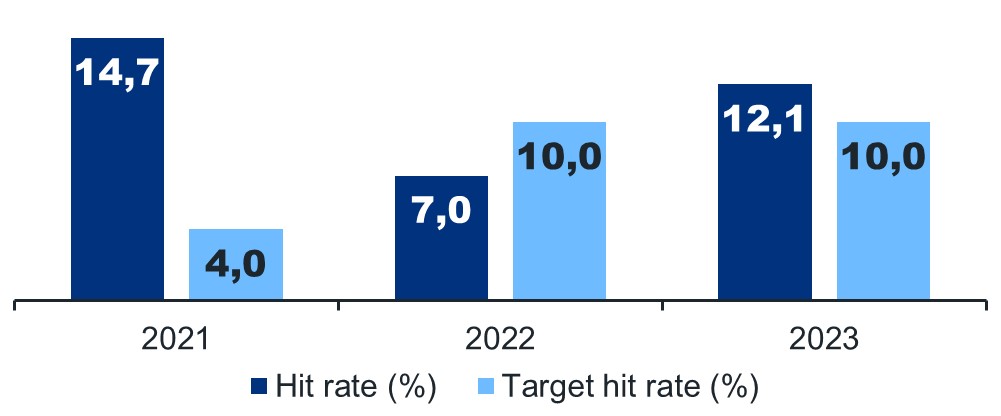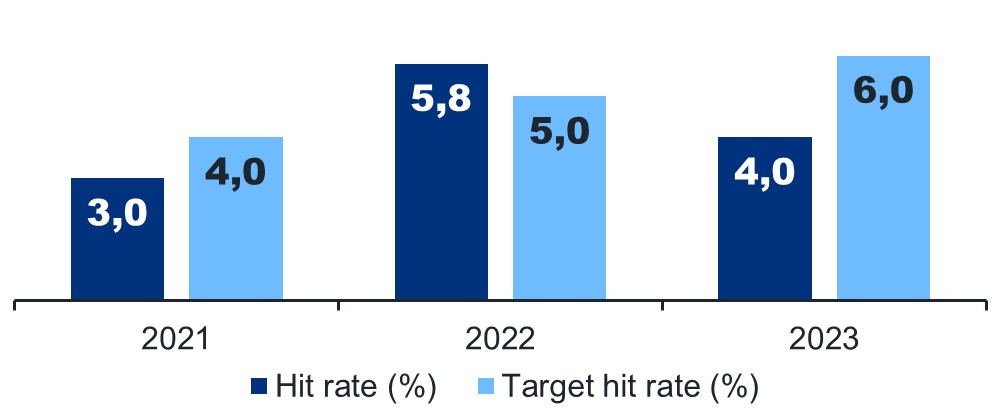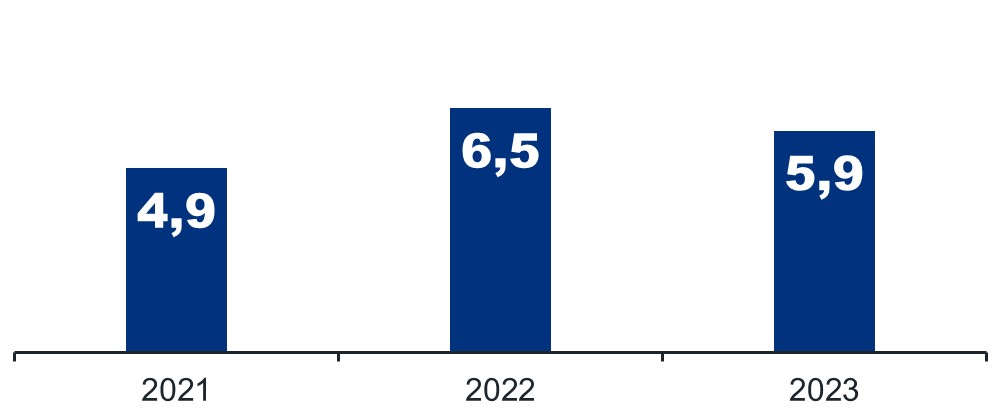We monitor and the movement of goods across the nation’s border and inspect goods. We protect the environment and the health of citizens by seizing from the flow of goods products that are harmful to health and the environment. This way, we combat illicit activity and prevent the spread of plant and animal diseases. This way, we also protect biodiversity, the forestry industry’s operating conditions, the food industry and food production in cooperation with several public authorities.
Finnish Customs has a new role as the national authority in charge of the EU Carbon Border Adjustment Mechanism (CBAM). The CBAM creates an economic incentive system for third-country manufacturers and EU importers to reduce emissions from production processes. As a national authority, we also naturally contribute to sustainable activities as part of our field of operations.
By monitoring hazardous materials, chemical and waste transportation, and the roadworthiness of vehicles, we ensure that hazardous substances, chemicals, and waste do not cause harm to nature and to citizens. Among other things, we stop vehicles that are malfunctioning, overloaded or incorrectly loaded from entering the flow of traffic in Finland.
We monitor product safety by testing the regulatory compliance of products in the Customs Laboratory. With the targeted control of food and consumer goods, we mainly protect the health of consumers. Meanwhile, we also prevent food fraud and promote fair competition among companies. Every year, up to one in ten products are found to be non-compliant with product safety regulations. For example, a toy can present a strangulation or choking hazard for a child, and a food product can contain microorganisms or pesticides that are harmful to health.
Our efforts
The CBAM is a new EU tool to prevent carbon emissions from being diverted out of the EU. The CBAM seeks to ensure that the prices of goods imported into the EU better reflect the global warming emissions generated in their production. In future, a fee will be levied on imported goods based on their emissions, corresponding to the emissions trading fee for a product manufactured in the EU. In practice, the CBAM creates an economic incentive system for third-country manufacturers and EU importers to reduce emissions from production processes. The CBAM creates a level playing field for manufacturers in the EU market.
The mechanism will apply to CBAM goods imported from outside the EU into all 27 EU Member States. CBAM goods include certain iron and steel products, fertilisers, aluminium and cement products, hydrogen and electricity, among other products. According to the actual figures for 2023, CBAM will apply to over 1,000 companies in Finland and all individuals importing CBAM products worth over EUR 150. As Finnish Customs is responsible for the control of the cross-border trade of goods and customs clearance, it is only natural that it becomes the competent authority for the CBAM. Its tasks will include the enforcement and monitoring of the CBAM Regulation, providing advice to its customers on the emission calculation of goods, intervening in incorrect emissions reporting and calculations, as well as the issuance and tracking of permits and the selling of CBAM certificates (emission certificates).
Read more
Carbon Border Adjustment Mechanism (CBAM) brings significant changes for importers
African swine fever is a disease caused by the ASF virus that kills pigs, miniature pigs and wild boars. There is no vaccine or treatment for the ASF virus. The disease is not transmissible to humans, but it is a significant economic threat to Finnish pig farming and the meat industry. The spread of the disease to Finland would result in major financial losses to pig farms and the entire meat industry from the destruction of animals, the renovation of facilities and the halting of foreign trade. In practice, pork exports would stop altogether. Consequently, combating African swine fever means protecting an entire industry.
The disease has spread in Asia and is also present in several European countries. African swine fever has also been detected close to Finland – in the Baltic states, Sweden and Russia. The threat of the disease spreading to Finland has increased.
The ASF virus can spread with food, goods and people. The prevention of the disease in Finland requires multi-authority cooperation. Finnish Customs is tasked with controlling the borders to ensure that passengers do not import any foods of animal origin from outside the EU. The private import of meat and dairy products from third countries to Finland is completely prohibited to prevent the spread of various animal diseases. The prohibition also applies to meat and dairy products meant for the private use of the recipient that are sent by post and ordered online. It is also recommended that meat products containing pork or wild boar are not imported at all as snacks or souvenirs from the EU Member States where African swine fever has been detected, as the spread of the disease and restriction zones can change very quickly. Prohibited meat and dairy products may be left in waste containers at border crossing stations. At airports, they may be handed over to customs officials. There are no sanctions for voluntary handover, but repeated or gross violations of the import prohibition may be punishable offences.
Two food dogs, Aino and Rico, are working in Finnish Customs to help fight animal diseases. Aino, a golden retriever, started in June 2018, and Rico, a labrador retriever, in June 2020. The food dogs have been an invaluable aid in the control of unauthorised food products. In 2023, Aino and Rico uncovered a total of 1,920 kilograms of prohibited meat and dairy products. In addition to the more common cured sausages and cultured-milk products, the dogs assisted in the confiscation of rarer products including smoked porcupine, dried camel and frozen penguins.
The food dogs work with cars and lorries, aboard buses and trains, and at ports and airports. Their work shifts range from 8 to 14 hours. However, they do not work continuously; instead, the work is broken down into periods suitable for the dog. After work, the dogs are always allowed to rest and recuperate.
The food dogs are trained to search and detect food of animal origin. When a dog discovers an illegal food product, it is rewarded with a toy or treats. The training of food dogs, like all other Finnish Customs dogs, is based on play, and the dogs find the activity rewarding.
Illegal importers of dogs often aim for substantial financial rewards without regard to the risk of spreading animal diseases.
In recent years, Finnish Customs has investigated smuggling cases in which dogs and puppies have been illegally brought to Finland from Russia, Ukraine, Hungary, Spain, Poland, Romania and the Baltic countries, among others. In one case investigated by Finnish Customs, the suspect sold nearly 180 dogs for approximately one thousand euros each without paying taxes on them. According to the Tax Administration, this resulted in approximately EUR 30,000 of unpaid value-added tax. Finnish Customs worked with the Police to investigate this wide-ranging case.
In another case investigated by Finnish Customs, dogs and puppies valued at over EUR 300,000 were sold in Finland between 2017 and 2022, and not all the income was reported to the Tax Administration. According to the Tax Administration, this resulted in approximately EUR 50,000 of unpaid value-added tax. Both cases also involve breaches of accounting obligations, so in addition to smuggling and aggravated tax fraud, the cases have also been investigated as aggravated accounting offences.
Finnish Customs has also investigated several cases of smuggling in which a private person has brought no more than the permitted number of dogs (five dogs) to Finland as pets but sold the dogs after importing them.
One purpose of the regulations on importing dogs is to prevent the spread of animal diseases that can infect animals and humans. The most dangerous diseases are rabies and echinococcosis, both of which can be fatal.
Read more
Finnish Customs Enforcement 2023: Illegal imports of dogs driven by substantial financial rewards
In 2022 and 2023, Finnish Customs’ Financial Crime Investigation Unit investigated international smuggling involving a large quantity of unrefrigerated fresh beef and lamb into Finland without the legal documentation. The case was uncovered during a Finnish Customs inspection at the West Harbour in Helsinki in spring 2022. The suspect tried to import a batch of meat into Finland by car from Latvia via Estonia. There were about 500 kilos of meat. The City of Helsinki Food Safety Unit asked Finnish Customs to investigate this case of suspected smuggling, illegal dealing with imported goods and health offence. The suspect stated that they had imported fresh or frozen meat into Finland in the past. The Finnish Food Authority came to the conclusion that such a large amount of meat could not be considered to be for private consumption. Instead, the meat must have been intended for commercial use. The suspect had also failed to register their activities, and the documentation was incomplete.
This was a serious case in terms of consumer safety. The imported meat could have harmed the health and safety of citizens. The improper import conditions put end consumers at risk of falling ill after eating the meat and could have enabled salmonella to spread among consumers. In addition to the consumer safety risks, illegal import such as this harms all the food industry operators who comply with law.
Read more
Finnish Customs Enforcement 2023: International meat smuggling and health offences
Finnish Customs notices the signs of a summer to be spent battling mosquitoes earlier and earlier every year, as individuals begin ordering mosquito repellent pads already during the early part of the year. For the last two springs, we have published on our website a notice that mosquito repellent pads are prohibited. Mosquito repellents are biocides, and their sale and use are subject to the Biocide Regulation. Importing mosquito repellents is prohibited unless the product is equipped with the proper packaging and approval labels. It is rare for products coming from third countries to have the correct labelling. Our communication seems to be yielding results, as Finnish Customs seized just over 400 shipments in 2023, compared to nearly 600 in 2022. Finnish Customs controls the import of biocides based on the Chemicals Act, which helps protect human health and the environment.
Read more
How to control insects in domestic environments? (Finnish Safety and Chemicals Agency Tukes)
Children’s growth and development are protected by limiting their exposure to harmful chemicals and protecting them from tangible hazards. For this reason, the most important items for Finnish Customs’ product safety controls are goods and food products intended for children. In 2023, Finnish Customs inspected almost 800 toys, children’s garments, baby care goods and children’s food products. One in five were found to be slightly or severely non-compliant.
Last year, Finnish Customs examined approximately 550 toys. Nearly 90 of the toys were rejected for a failure to comply with the regulations, most commonly due to a mechanical or structural flaw. Mechanical flaws included small parts that posed a choking hazard, packaging bags that were too thin and strings or cords that posed a strangulation hazard such as hobby horse reins that were too long. Chemicals harmful to health were also found fairly frequently. For example, phthalate plasticisers were found in five toys, nickel in four toys and lead in one toy. Dozens of toys were lacking labels on the safe use of the product or the CE marking to indicate conformance. Many minor flaws were also discovered.
The most common flaws in children’s clothing were drawstrings that posed a risk of strangulation or entanglement. Ten pairs of children’s trousers were found to have a drawstring at the waist that was too long, incorrectly attached or contained three-dimensional parts. Such strings pose a risk of the child becoming entangled in play equipment, for example. The hood of a hoodie had a drawstring that posed a risk of strangulation. A total of about 150 children’s garments and shoes were investigated.
Some 100 childcare products and children’s food products were investigated. Among childcare products, dishes and utensils were especially problematic. These were rejected due to substances that could be harmful to health in food such as lead and melamine. In addition, two chains for baby dummies were found to contain small parts that posed a choking hazard. The problems with children’s foor products were related to mould toxins found in four different snack bars. The nutrient content of one children’s food product was excessive. In addition, minor errors were found in the labelling of childcare supplies and children’s food products. The products rejected due to a violation of the regulations were not allowed through to shops or consumers if the flaws posed a direct hazard. In some cases, the product could be repaired by correcting the labels, for example. In these cases, Finnish Customs also supervised the repairs.
Dangerous consumer goods declared via the EU Safety Gate system in 2023
Total declarations |
Declarations by Finland |
Declarations by Finnish Customs |
|---|---|---|
3,412 |
76 |
36 |
Food and food contact materials posing a severe hazard reported in the RASFF system in 2023
Total declarations |
Declarations by Finland |
Declarations by Finnish Customs |
|---|---|---|
4,695 |
80 |
47 |
Products inspected by Finnish Customs for product safety in 2023
Total products inspected |
Of which noted and rejected |
Hit rate |
|---|---|---|
4,806 |
1,300 |
27% |
Finnish Customs controls led to 1,002 food products and 298 consumable goods being rejected or commented on.

